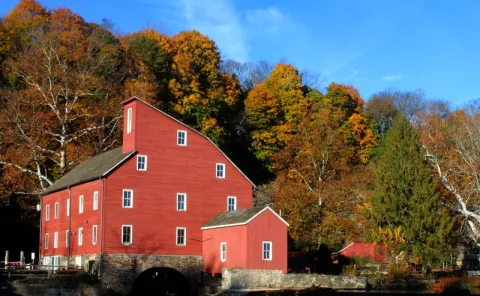
Retirement is a time to enjoy the fruits of one's labor, and choosing the right place to settle down is a crucial decision. New Jersey, often referred to as the Garden State, offers a unique blend of suburban tranquility, urban amenities, and coastal beauty. This article explores the aspects of living in New Jersey for retirees, focusing on overall quality of life, cost of living, crime and safety, access to quality healthcare, weather, and culture, with comparisons to the national average.
New Jersey boasts a high quality of life, with a mix of bustling cities, charming small towns, and picturesque coastal areas. The state's diverse landscape and proximity to major metropolitan areas like New York City and Philadelphia provide residents with ample opportunities for entertainment, dining, and cultural experiences. The state's public transportation system, including NJ Transit, offers convenient access to these cities, making it ideal for those who enjoy urban outings.
Compared to the national average, New Jersey offers a higher median household income, which contributes to a generally comfortable lifestyle. The state also has a well-developed public education system and numerous recreational opportunities, including state parks, beaches, and golf courses, making it an attractive place for retirees looking to stay active.
The cost of living in New Jersey is notably higher than the national average. Housing costs, in particular, can be substantial, especially in desirable coastal and suburban areas. Property taxes are among the highest in the country, which can be a significant consideration for retirees on a fixed income. However, the state offers property tax relief programs for seniors, which can help alleviate some of the financial burdens.
While the cost of healthcare, groceries, and utilities is also above the national average, the state's higher median income often offsets these expenses. Retirees may find that their purchasing power varies significantly depending on the region within the state, with the northern and coastal areas being more expensive than the south.
New Jersey has a lower overall crime rate compared to the national average, with particular strengths in reducing property crime and violent crime rates. Many of the state's suburban and rural areas are considered safe, with well-funded police departments and community-oriented policing efforts. However, like any state, crime rates can vary widely from one area to another, with some urban areas experiencing higher crime rates.
For retirees, choosing a community with a low crime rate can contribute to peace of mind and a sense of security. Many retirement communities in New Jersey offer gated access and security features, enhancing safety for their residents.
New Jersey offers excellent access to healthcare, with a higher-than-average number of physicians per capita and numerous top-rated hospitals. The state's healthcare facilities are renowned for their quality, with several hospitals specializing in geriatric care and chronic conditions often affecting older adults. The proximity to world-class medical institutions in nearby New York and Philadelphia also provides residents with access to specialized care.
The state ranks well in terms of health insurance coverage, with a variety of Medicare Advantage plans available to retirees. However, healthcare costs in New Jersey can be higher than the national average, making it important for retirees to consider their healthcare needs and budget accordingly.
New Jersey consistently ranks as one of the states with the highest overall tax burden in the United States. This high tax burden is primarily driven by the state's substantial property taxes, which are among the highest in the nation. In addition to property taxes, New Jersey residents face significant income and sales taxes, contributing to the state's overall tax load.
When compared to other states, New Jersey's tax burden is one of the heaviest, placing it near the top of the list in national rankings. The combination of high property taxes and relatively high income taxes makes New Jersey less tax-friendly than many other states, leading to a higher percentage of residents' income going toward state and local taxes. This ranking reflects the state's reliance on these taxes to fund its budget and public services.
New Jersey's rich cultural tapestry is influenced by its diverse population and historical significance. The state offers a vibrant arts scene, with numerous theaters, museums, and music venues. The state's culinary scene is also diverse, with a mix of traditional American fare and international cuisines, reflecting its multicultural population.
Compared to the national average, New Jersey offers a higher concentration of cultural amenities and recreational activities, particularly in the northern part of the state. The state's proximity to New York City and Philadelphia enhances access to world-class cultural experiences, from Broadway shows to major art exhibitions.
New Jersey experiences a four-season climate, with hot summers, cold winters, and mild springs and autumns. The coastal areas enjoy a more temperate climate, with cooler summers and milder winters compared to the inland regions. This variety allows for a range of outdoor activities throughout the year, from beach outings in the summer to skiing in the nearby Pocono Mountains during the winter.
Compared to the national average, New Jersey's weather is relatively moderate, with fewer extreme weather events. However, the state can experience nor'easters, which bring heavy snow and strong winds, particularly in the winter months. Coastal areas are also susceptible to hurricanes and tropical storms.
New Jersey presents a compelling option for retirees, offering a high quality of life, excellent healthcare, and a rich cultural environment. While the cost of living and property taxes can be higher than the national average, the state's benefits, including safety, access to amenities, and diverse recreational opportunities, make it a desirable place to enjoy retirement. When considering retirement in New Jersey, it's essential to weigh these factors and explore the various regions to find the best fit for one's lifestyle and budget.




